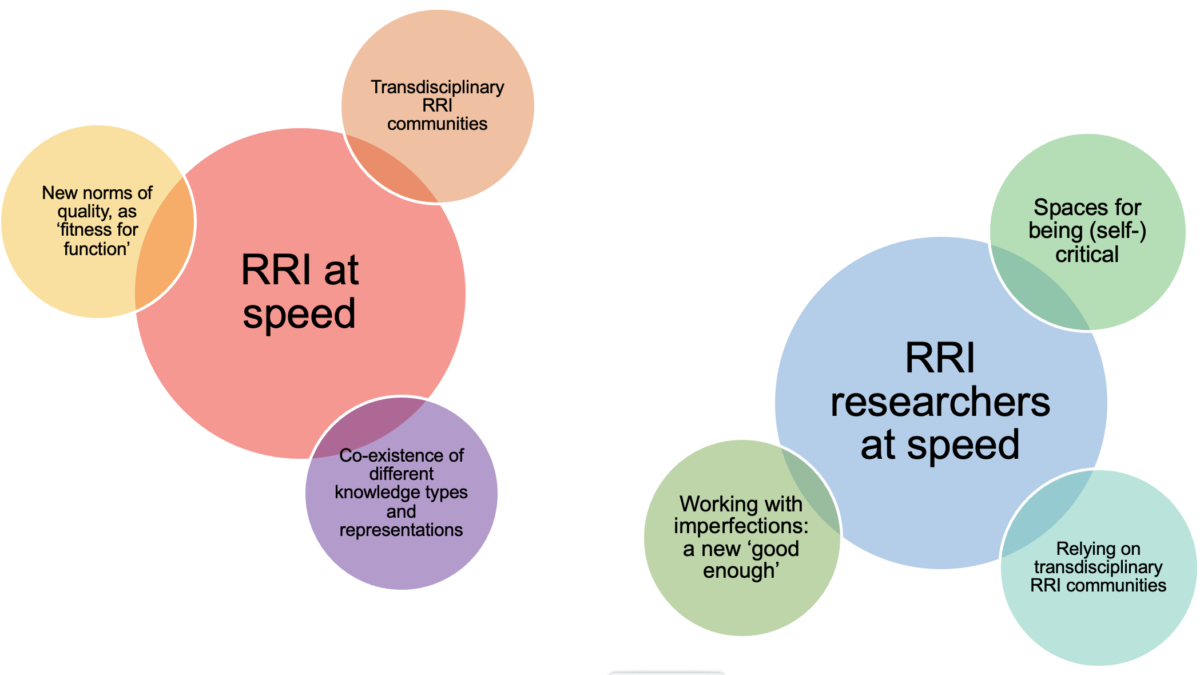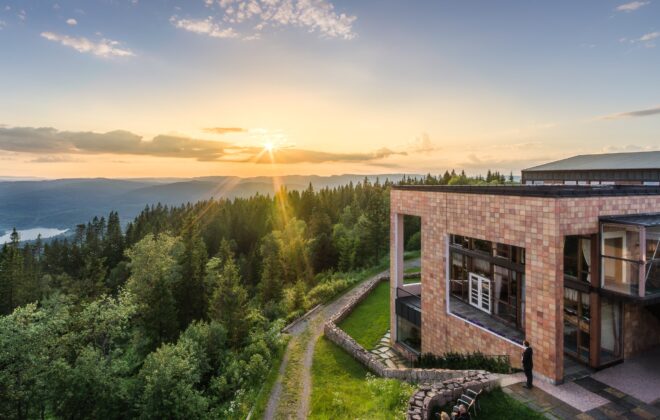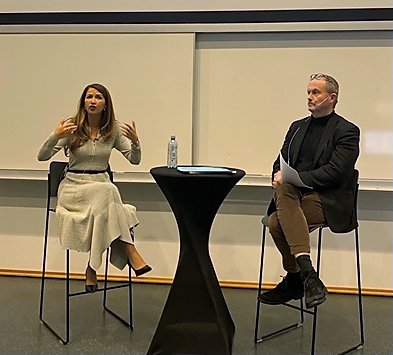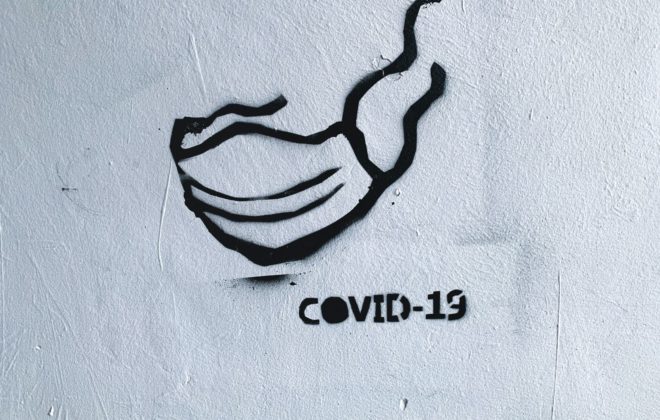RRI at speed
How could transdisciplinary RRI communities help?
It is frequent that researchers and practitioners involved in RRI face issues that are characterised by urgency, complexity and uncertainty, and this poses important questions:
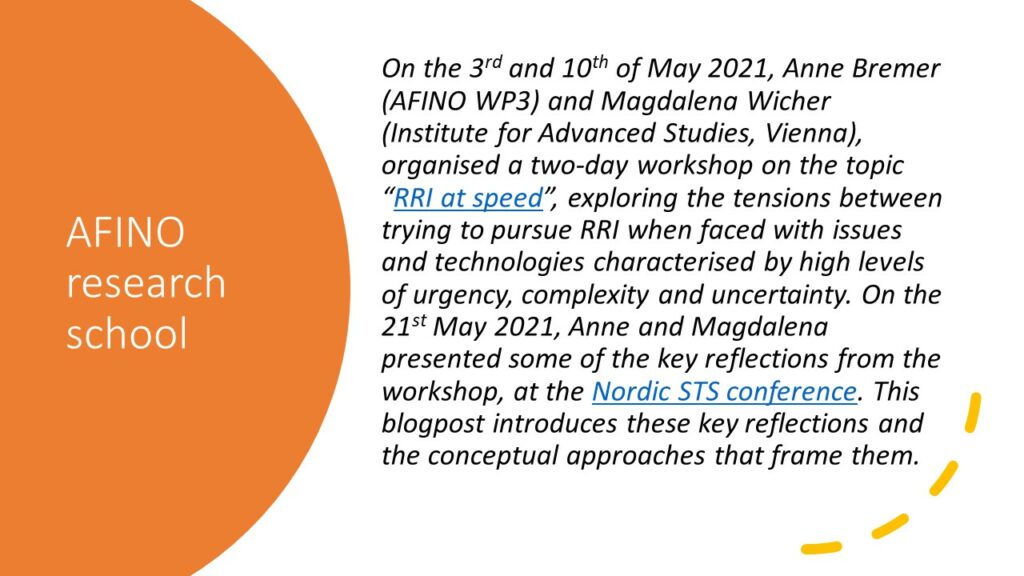
- How can we be reflexive and investigate our own roles, values, preferences and interests, when a technology is emerging and developing fast?
- How can we be inclusive and encourage interdisciplinary or transdisciplinary approaches, when an issue is urgent?
- How can we be responsive, and iteratively re-adjust to public concerns and demands, and to the unique political, social, environmental contexts when a decision is demanded quickly?
- How can we anticipate contingencies and side-effects when predictions are impossible to make in a short timeframe?
In other words, how can we make sure that we are being responsible under conditions of speed? How can we avoid that RRI is a luxury that we sometimes cannot afford?
In the workshop, we discussed two conceptual approaches that help us investigate these questions.
The first one is post-normal science (Funtowicz and Ravetz, 1990; 1993), that suggests a new mode of science for issues where knowledge involves inherent uncertainties and complexities, where values are in debate, stakes are high and decisions are urgent (typically, the Covid-19 pandemic is a post-normal science issue).
One way to navigate these issues in a responsible way is by conveying an ‘extended peer-community’, where not only the ‘traditional’ actors are involved in the knowledge production and decision-making processes, but where a broad range of stakeholders are engaged in a setting that allows for a co-existence of plural (explicit and tacit) knowledges and cultures. A critical and reflexive dialogue is key for bridging the different knowledge types, and knowledge quality is evaluated as ‘fitness for function’.
Establishing an ongoing, iterative, fluid extended-peer community around a post-normal science issue takes time, but when the urgency of a decision hits, one might be more prepared to ‘jump out’ of that iterative process to take a decision based on the knowledge and resources available at that precise time, and deemed of high quality.
The second conceptual approach is Bourdieu’s notion of reflexivity (Bourdieu and Wacquant, 1992).
According to Bourdieu, reflexivity is about making explicit one’s different roles and positions, for instance as a researcher, practitioner, citizen, family member and so on, and looking at the blind spots that those different roles entail. It is about positioning oneself in an explicit and transparent way, to understand the different structuring forces (such as norms, values and hierarchies) and capitals (such as economic and social) that guide our own agendas, values and priorities.
Being reflexive about our different roles and positions might help navigate urgent issues, by better understanding the conditions under which knowledge is produced and decisions are made. Here too, committing to a reflexive practice as Bourdieu suggests takes time, but if one is involved in such iterative practice, then one might be better equipped to ‘jump out’ under conditions of urgency, to take a decision (or make a recommendation) that reflects the awareness of the different structuring forces and various agendas and priorities.
The workshop participants worked on practical exercises of reflexivity and positioning, as well as on making the ‘post-normal science’ dimensions of their own project explicit. They cooperatively worked using an online whiteboard tool, of which this is an extract:
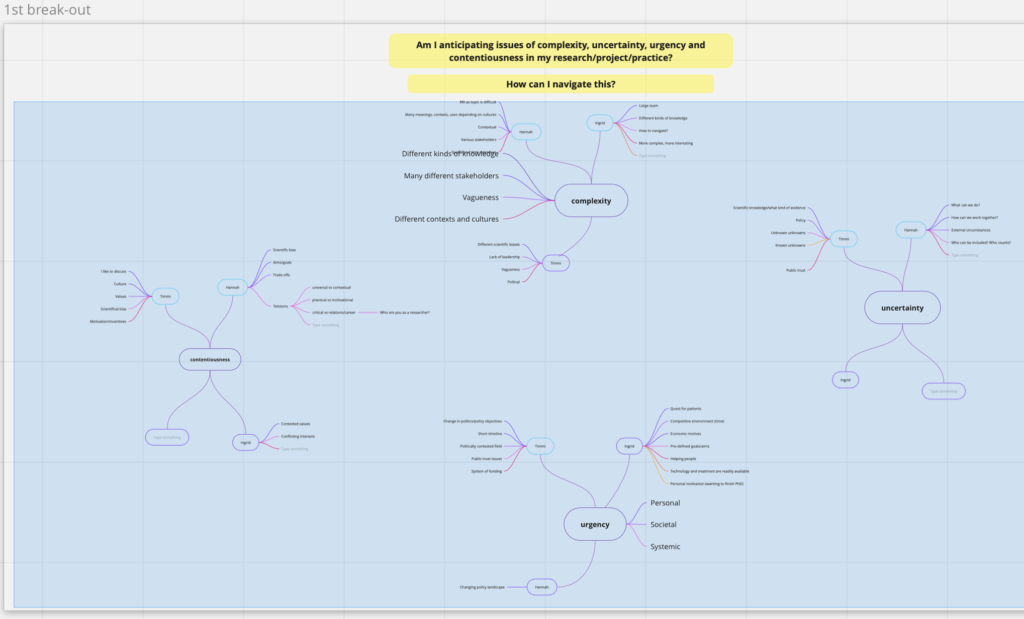
The introduction to post-normal science and reflexivity in the Bourdieusian sense, as well as the cooperative group exercises and the participants’ presentations, led us to the following key reflections relative to RRI at speed:
- RRI at speed: transdisciplinarity and new norms of quality
RRI at speed would benefit from being organised according to extended modes. Indeed, it is precisely the urgency, complexity and uncertainty of the issue at hand that make room for different – and legitimate – meanings, norms, ideas and values; and these have to be integrated in the knowledge production and decision-making processes.
In other words, urgency, complexity and uncertainty create the opportunity for an extended culture of RRI, based on transdisciplinary communities of which RRI researchers could be part of.
These transdisciplinary communities could constitute a space for addressing fundamental questions on what kind of future is desirable, what kind of technologies we want to see through, and what kind of society we want. Engaging in such extended mode of RRI also means adopting new norms of quality.
At speed, the quality of evidence that we rely on for making decisions varies a lot. For instance, model predictions are often very uncertain. A transdisciplinary RRI community could act as a structuring space where different knowledge types, forms of evidence and representations can co-exist, and are not collapsed into one single metric. Here, quality would take on a new definition, along the lines of ‘fitness for function’: does the knowledge/experience/data help the decision-making process, right now?
A critical and reflexive dialogue within the transdisciplinary RRI community would be key to explore what kind of knowledge is relevant, important and robust, at the time the decision needs to be made. - RRI researchers at speed: spaces to be (self-) critical, and a new standard for what is ‘good enough’
RRI researchers confronted to post-normal science issues are exposed to a great level of complexity, uncertainty and urgency. Indeed, the research and innovation processes impact social, cultural and relational aspects in intricate ways; from identities, to values, traditions and heritage.
These processes have complex and non-linear local, global, short-term and long-term impacts, that are impossible to anticipate. Under these conditions, the reflexive process of positioning (reflecting on one’s own roles and values) is extremely challenging, and RRI researchers would benefit from having spaces for being reflexive and (self-) critical.
Arguably, constituting a transdisciplinary RRI community would help create such a space, by supporting critical discussions of different knowledges and values. However, creating a transdisciplinary RRI community implies having ongoing interactions with its different members, by for instance meeting regularly. The current conditions of the pandemic make this even more challenging, and have added uncertainties to all RRI projects.
The RRI researcher therefore needs a new standard for what is ‘good enough’. It is not about aiming for perfection. It is about being able to ‘jump out’ of the transdisciplinary RRI community and its ongoing, iterative, imperfect process, to propose a ‘good enough’ decision/advice/recommendation at the time it is demanded, while being transparent about the (incomplete) resources and knowledge under which it has been drafted.
Featured image: Summary of the key reflections about RRI at speed, by Anne Blanchard.
Bourdieu, P., and Wacquant, L. (1992). An invitation to reflexive sociology. Cambridge, UK: Polity Press.
Funtowicz, S., and Ravetz, J. (1990). Post-normal science: a new science for new times. Scientific European, 266(10), 20-22.
Funtowicz, S., and Ravetz, J. (1993). Science for the post-normal age. Futures, 25(7), 739-755.

Anne Blanchard
Anne Blanchard is a researcher at the Centre for the Study of the Sciences and the Humanities at the University of Bergen, where she is working on projects studying how science is employed for complex and uncertain climate and health challenges.
She is also the leader of The AFINO Research School. Read more about Anne at AFINO's webpage.

